Eight Hours Don't Make a Day Blu-ray Movie
HomeEight Hours Don't Make a Day Blu-ray Movie 
Acht Stunden sind kein TagCriterion | 1972-1973 | 495 min | Not rated | Oct 09, 2018

Movie rating
7 | / 10 |
Blu-ray rating
| Users | 1.0 | |
| Reviewer | 3.5 | |
| Overall | 3.1 |
Overview
Eight Hours Don't Make a Day (1972-1973)
The interlocking stories of blue collar workers in 1970s Germany as they confront issues of the day, such as the unfairness of the work power structure, making ends meet and facing Germany's changing social mores.
Starring: Gottfried John, Hanna Schygulla, Werner Finck, Wolfgang Schenck, Rudolf Waldemar BremDirector: Rainer Werner Fassbinder
| Foreign | Uncertain |
| Drama | Uncertain |
Specifications
Video
Video codec: MPEG-4 AVC
Video resolution: 1080p
Aspect ratio: 1.37:1
Original aspect ratio: 1.37:1
Audio
German: LPCM Mono
Subtitles
English
Discs
Blu-ray Disc
Two-disc set (2 BDs)
Playback
Region A (locked)
Review
Rating summary
| Movie | 3.5 | |
| Video | 4.0 | |
| Audio | 4.0 | |
| Extras | 2.0 | |
| Overall | 3.5 |
Eight Hours Don't Make a Day Blu-ray Movie Review
That's just the way it is.
Reviewed by Jeffrey Kauffman November 30, 2019Bruce Hornsby exploded onto the airwaves in 1986 with “The Way It Is”, a kind of curious song in the annals of Number One charting singles in that it addressed a whole host of socio-economic issues, certainly not the traditional “stomping grounds” for a Top 40 tune. Many folks probably (not totally inaccurately) remember Hornsby’s song as a critique of racism, but there is actually other content in the lyric mentioning perhaps unavoidably linked aspects like unemployment and the disparity between the “haves” and “have nots”. Hornsby’s lyric repeatedly uses the trope “that’s just the way it is” to sum up how many people respond to a world that is obviously broken in some indelible way(s), and rather remarkably if understandably that very line turns up as a mantra of sorts in Rainer Werner Fassbinder’s 1972 — 1973 five episode television offering Eight Hours Don’t Make a Day, an outing which perhaps ironically in some ways includes the sobriquet “a family series”. That description is explicated in some of the supplements included on this release, in that German television often had so-called “family series” which were typically dramas about middle class clans that might be analogs, at least in some ways, to American shows like, well, Family, the ABC entry starring Sada Thompson and James Broderick that aired for several years just a few years after Eight Hours Don’t Make a Day did in Germany.
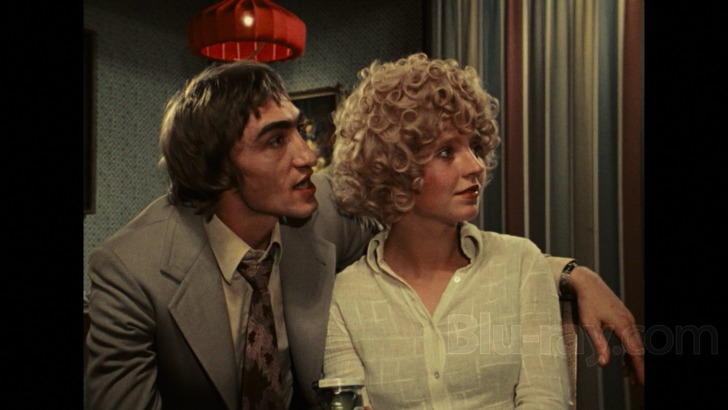
American television can be a good example of the “trend” that is mentioned in some of the supplementary material on this release, where family units in the post-war era were typically shown to be upwardly mobile (a trend which probably “peaked” in more ways than one in the late seventies and early eighties with families who were undeniably wealthy, as in the duelling nighttime soap operas Dallas and Dynasty ). Just looking over dramas and comedies that aired on this side of the pond from the 1950s on, it’s surprisingly difficult to come up with shows that featured working class focal characters. There was Jackie Gleason’s addled bus driver Ralph Kramden in The Honeymooners, a show which also featured a probably even better example of a working class stiff courtesy of Art Carney’s Ed Norton, who toiled away in the sewers underneath New York City. Interestingly, Jackie Gleason also was initially the star of the television series version of Life of Riley, another early 50s effort that featured a family that, while perhaps somewhat more upwardly mobile than the Kramdens and Nortons, was probably resolutely in “blue collar” territory.
Comedies started featuring more upscale families as the fifties proceeded and ultimately gave way to the sixties and seventies, and it’s kind of challenging to come up with any examples of working class types in that genre until shows like All in the Family and Roseanne came along a significant amount of time later. It’s kind of funny in a way to look at little remembered shows like the long ago Herschel Bernardi sitcom Arnie, a show that debuted in the wake of the immense success of All in the Family and which concerned a factory worker seemingly plucked out of the workaday world at random to become an executive, or even the much more recent Working Class, which plied somewhat the same territory, albeit in this case vis a vis a single mother attempting to claw her way up the socioeconomic ladder to better provide for her kids. The reason why it may be funny to look back at these shows is due to the fact that Arnie barely managed to eke out two seasons, and Working Class only lasted one, due to low ratings for both, something that may indicate that audiences aren’t that interested in seeing hardscrabble types attempting to make better lives for themselves. (In that regard, some may find this article in Politico I stumbled across while doing research for this review of some interest.)
Considering the fact that many dramas throughout the entire history of American television tended to feature “high earners” like doctors or lawyers, it can be even more of a challenge to find examples of blue collar types in that idiom, though that tendency has opened up somewhat in more modern times. That said, there may not be a suitable analog to Eight Hours Don’t Make a Day, at least in terms of how Rainer Werner Fassbinder manages to craft a story involving labor unrest at a factory that actually deals with that unrest almost as a tangent to interpersonal stories involving factory worker Jochen Epp (Gottfried John). It’s also probably worth mentioning that despite the “worker” underpinning of much of this often pretty florid and soap operatic tale, Jochen and his family definitely seem to be at least a few rungs up on the socio-economic ladder.
What’s kind of interesting in the “labor movement” side of things in Eight Hours Don’t Make a Day is that it’s Jochen’s new girlfriend Marion Andreas (Hanna Schygulla) who kind of prods Jochen on into becoming something of an activist. Other elements in the story bring in sidebars involving Jochen’s family members, including his grandmother Oma (Luise Ulrich), who more or less shacks up with an elderly man named Gregor (Werner Fink) and ultimately opens up a kind of daycare for kids in an abandoned building. There’s also a running subplot involving Jochen’s sister Monika (Renate Roland), who is ensconced in an unhappy marriage with Harald (Kurt Raab). As even one of the supplements unapologetically mentions, the acting in this miniseries can be on the hyperbolic side, and the entire story has the kind of overheated ambience of a Douglas Sirk film, something that is evidently not a coincidence, since Fassbinder evidently idolized Sirk and at some point went to Switzerland, where Sirk was residing, in order to hobnob with him.
Aside from some of the amped up performances (John and Schygulla are at least relatively more naturalistic), Eight Hours Don't Make a Day has other elements which some viewers may find downright odd. The miniseries is filled, as in stuffed, with scenes featuring flowers, for no reason I personally could ascertain. Fassbinder also exploits other kind of weird stylistic flourishes in terms of his framings, with some scenes offering tilted angles where I half expected an animated "pow" and "bam" to intrude, along with a certain Caped Crusader from sixties television of a whole other kind. Of course, I'm joking, but the bottom line is this supposed examination of working class unrest has less of the verité ambience some may expect the story might reasonably offer, with Fassbinder’s sometimes more manic tendencies fully on display.
Eight Hours Don't Make a Day Blu-ray Movie, Video Quality 
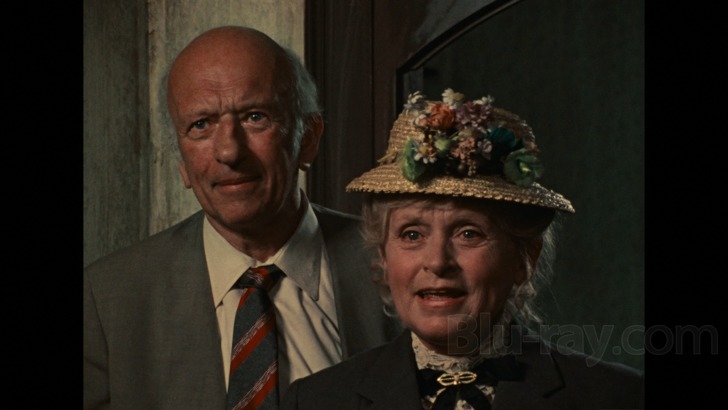
Eight Hours Don't Make a Day is presented on Blu-ray courtesy of The Criterion Collection with an AVC encoded 1080p transfer in 1.37:1. Every episodes includes a brief text card which more or less repeats verbiage about the transfer found in the accordion style foldout insert included with this release:
Eight Hours Don't Make Day is presented in its original aspect ratio of 1.37:1. On widescreen televisions, black bars will appear on the left and right of the image to maintain the proper screen format. This new digital restoration was undertaken at Arri Film & TV in Munich by the Rainer Werner Fassbinder Foundation from a transfer created in 2K resolution on an Arriscan film scanner from the 16 mm reversal positive."16 mm reversal positive" are probably the operative watchwords when assessing this transfer, as can most likely be readily seen in the screenshots accompanying this review. The often kind of peach or tan ambience that can accompany CRI sources are very much in evidence here, something that can tend to give the entire palette a somewhat odd and unnatural look at times, perhaps most noticeable with regard to (but not limited to) flesh tones. There can also be a somewhat bluish undertone to selected sequences, notably some of the factory material. That said, some primaries like red actually pop quite nicely. Fassbinder's prevalent use of close-ups (however skewed at times) offer good levels of fine detail, but some midrange shots, especially some outdoor material, can look fairly fuzzy, without much in the way of fine detail. I noticed no compression anomalies, and the entire presentation boasts a nicely organic appearance without overt signs of over zealous digital tweaking.
The original monaural soundtrack was remastered from the 16 mm original mix tapes.
Eight Hours Don't Make a Day Blu-ray Movie, Audio Quality 
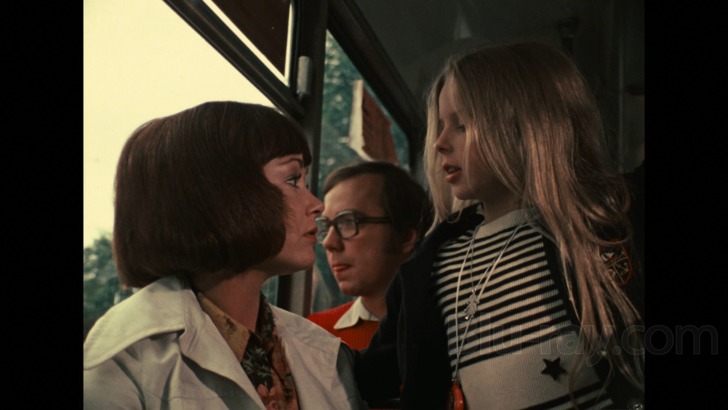
Eight Hours Don't Make a Day features a fine sounding LPCM Mono track in the original German. The series has a rather nice, if somewhat cheesy, orchestral score by the wonderfully named Fuzzy, which sounds full bodied and distortion free. Dialogue is rendered cleanly and clearly throughout, though there are certain scenes with groups gathered around tables (a lot of this miniseries features such scenes) can occasionally offer moments where individual lines might be slightly swallowed in the back and forth. Sound effects in the factory scenes and ambient environmental sounds in general sound decently energetic and expressive on this problem free track.
Eight Hours Don't Make a Day Blu-ray Movie, Special Features and Extras 
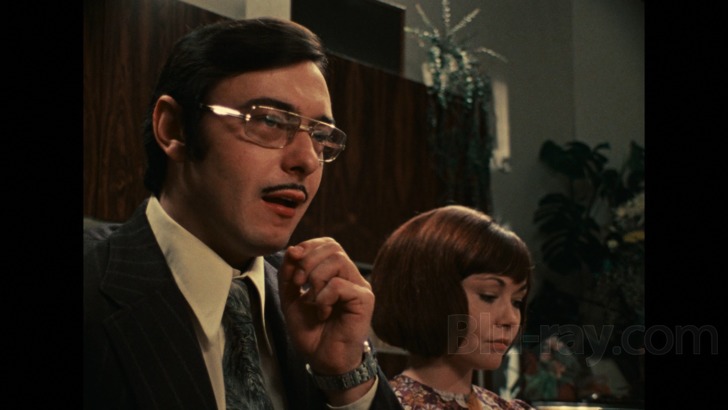
- "Eight Hours Don't Make a Day": A Series Becomes a Family Reunion (1080p; 42:01) is a 2017 retrospective by Fassbinder collaborator Juliane Lorenz, featuring interviews with several key participants and archival footage of Fassbinder.
- Jane Shattuc (1080p; 19:30) is an interesting interview from 2018 with Fassbinder expert Shattuc.
Note: Both of these supplements can be found on Disc Two of this two disc set.
Eight Hours Don't Make a Day Blu-ray Movie, Overall Score and Recommendation 
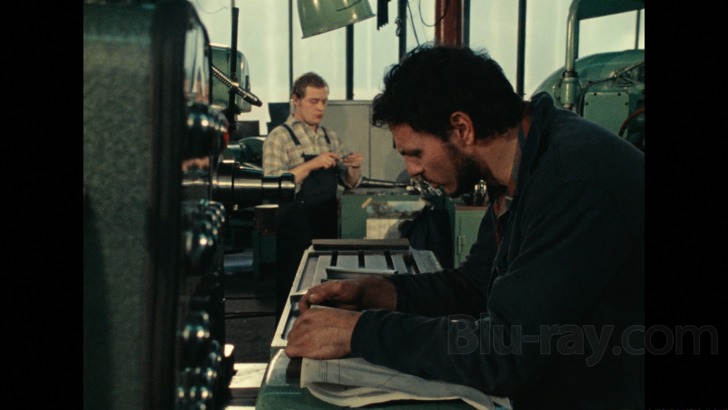
I frankly seem to be something of an outlier among my film fan friends who know about Fassbinder: most of my acquaintances are rather strongly split into either "love him" or "hate him" camps. I'm a bit more ambivalent, often appreciating Fassbinder's ambition at tackling long form works that have novelistic approaches, but also chafing at times to some of his stylistic excesses and penchant for overheated dramatics. Eight Hours Don't Make a Day will almost certainly appeal to those who are firmly in the "love him" camp, but others who either can't stand Fassbinder at all or find themselves more aligned with my "take him or leave him" reaction may find this piece a bit of a slog, though that said, this is an unusually "cheerful" (a relative term) effort from Fassbinder. Technical merits are solid with an understanding of the source element used for this transfer, and as usual Criterion includes some appealing supplements.
Similar titles
Similar titles you might also like

The Marriage of Maria Braun
Die Ehe der Maria Braun
1978

Ali: Fear Eats the Soul
Angst essen Seele auf
1974

Jeanne Dielman, 23, quai du Commerce, 1080 Bruxelles
1975

The Silence
Tystnaden
1963

Dekalog
The Decalogue
1988

Sawdust and Tinsel
Gycklarnas afton
1953

Scenes from a Marriage
Scener ur ett äktenskap / Television and U.S. Theatrical versions
1973

Winter Light
Nattvardsgästerna
1963

Through a Glass Darkly
Såsom i en spegel
1961

Fox and His Friends
Faustrecht der Freiheit
1975

To Joy
Till glädje
1950

The Rite
Riten / The Ritual
1969

After the Rehearsal
Efter repetitionen
1984

Alice in the Cities
Alice in den Städten
1974

Port of Call
Hamnstad
1948

Thirst
Törst
1949

A Ship to India
Skepp till Indialand / A Ship Bound for India
1947

Dreams
Kvinnodröm
1955

The Passion of Anna
En passion
1969

Wild Strawberries
Smultronstället
1957